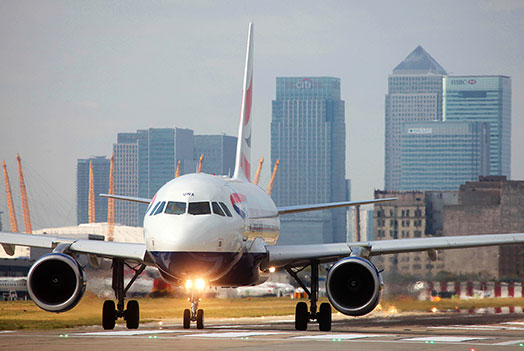More air routes mean better investments
The air transport agreement between the US and the EU on open skies between the continents is making investments shoot up. Americans are making more acquisitions and having greater success.
27.08.2015 - Text: Ellen Balke Hveem. Photo: Øyvind Lothe.
Tyler Hull, Associate Professor in the Department of Finance at NHH, has studied the consequences of proximity to investment objects in using the open skies agreement.
Removing restrictions
"Basically, our findings are all about the proximity between the investor and the investment object. We use the agreement on open skies, which removes government restrictions on air traffic between countries, as a measure of distance. The findings from our study suggest that countries and states should remove restrictions on air traffic in order to reduce barriers to LBO investments," said Hull.
With Thomas J. Chemmanur of Boston College and Karthik Krishnan of Northeastern University as co-authors, Hull has written the article "Expertise or Proximity in International Private Equity? Evidence from a Natural Experiment".
They study how the open skies accord between the US and other countries affects opportunities for successful acquisitions across borders by US private equity investors.
Valued too low

Associate Professor Tyler Hull at the Department of Finance at NHH.
"Acquisition investors are often criticised for hand-picking the companies they invest in. When they show good results, the critics say it is because the companies are valued too low before being acquired, rather than because investors succeed in improving them," Hull pointed out.
The study examines the volume and results of so-called LBO investments, i.e. acquisitions with a large proportion of debt financing. These are particularly suitable investments, according to Hull, because the investor is expected to provide both capital and expertise to the company acquired.
In order to provide expertise, the investor must have some possibility of becoming directly involved and improving the company.
Hand-picked
"An interesting question is therefore how much of the increase in value comes from hand-picking and how much comes from the ability to improve the company through the investor's expertise," said Hull.
The results show that it is not only investments that increase as a result of greater proximity to the investment, but also the actual value of the company concerned.
The researchers found that investors who are able to monitor acquisitions with shorter distances over a longer period have been more successful than the companies acquired prior to the open skies agreement. This indicates the benefit of monitoring a company that is closer, over a longer period, compared to a company at a greater distance.
"Although we live in a globalised world, there is still often considerable distance between investors and investments. The distance between two investments is not expected to change, so when you consider an investment, you do so on the basis of the distance already existing between you and the object," explained Hull.
The researchers have found that investments in other and new countries increase with a shorter distance. The NHH researcher also assumes that the quality of investors improves when the distance decreases.
The best ones do not travel
The study shows that American investors successfully compete against local and other foreign investors, and have a greater likelihood of a successful acquisition. This is despite the fact that most investors are familiar with solutions such as Skype and video conferencing, which can be used to maintain contact with the company acquired.
Technological innovations cannot, however, according to Hull, replace the importance of actually visiting a company.
"It's not necessarily the case that no one travels because of the distance. It may be that the very best people aren't willing to go when the distance is great, but send someone with less experience. The best people can often choose where to go, and will prefer shorter flights and staying closer to home. The opens skies agreement may encourage the best people to travel further," said Hull.

One of British Airway's airplanes from NY to London. Photo: BA.
Also well-established US-UK relations
The study shows that the open skies agreement not only affects investment relations between the US and countries not yet well integrated into the world economy. Investment between countries such as the US and UK has also increased.
"People often ask if these countries aren't already well integrated. So it's rather interesting that we find a significant difference before and after the open skies agreement," said Hull.
Before the agreement was signed in 2007, only two airlines were licensed to fly between the US and Heathrow. Some of the biggest US airlines, such as Delta, were not allowed to fly in.
"After the agreement entered into force, many new airlines arrived on the scene. New cities and new direct routes were connected to London, and passenger volume rose significantly. Because these barriers to free trade and competition were removed, we saw changes in investment volume and greater success with investments, and this included countries that already had good relations".
Tyler Hull
In recent years, Tyler Hull has also published "How the Timing of Dividend Reductions can Signal Value" (2015) and "Does the Timing of Dividend Reductions Signal Value? Empirical Evidence" (2013), both in the Journal of Corporate Finance. In 2013 he also published "The Impact of Technical Defaults on Dividend Policy" (with Laarni Bulan) in the Journal of Banking and Finance.
Download the article "Expertise or Proximity in International Private Equity? Evidence from a Natural Experiment"
|

